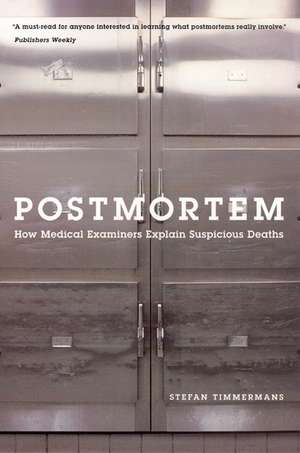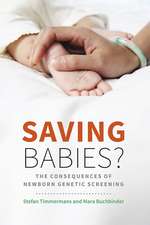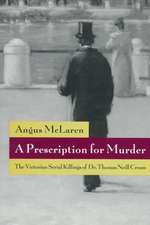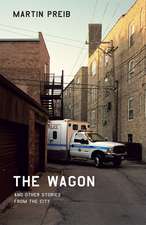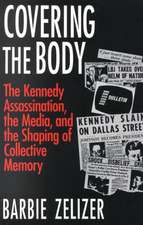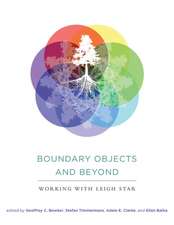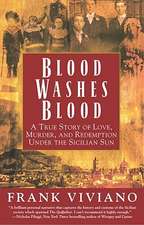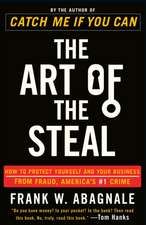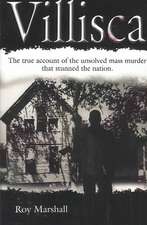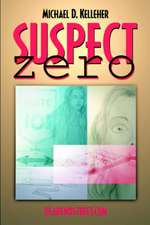Postmortem: How Medical Examiners Explain Suspicious Deaths: Fieldwork Encounters and Discoveries
Autor Stefan Timmermansen Limba Engleză Paperback – 15 apr 2007
As elected coroners were replaced by medical examiners with scientific training, the American public became fascinated with their work. From the grisly investigations showcased on highly rated television shows like CSI to the bestselling mysteries that revolve around forensic science, medical examiners have never been so visible—or compelling. They, and they alone, solve the riddle of suspicious death and the existential questions that come with it. Why did someone die? Could it have been prevented? Should someone be held accountable? What are the implications of ruling a death a suicide, a homicide, or an accident? Can medical examiners unmask the perfect crime?
Postmortem goes deep inside the world of medical examiners to uncover the intricate web of social, legal, and moral issues in which they operate. Stefan Timmermans spent years in a medical examiner’s office following cases, interviewing examiners, and watching autopsies. While he relates fascinating cases here, he is also more broadly interested in the cultural authority and responsibilities that come with being a medical examiner. How medical examiners speak to the living on behalf of the dead is Timmermans’s subject, revealed here in the day-to-day lives of the examiners themselves.
“Postmortem is a wake-up call to forensic pathology. . . .This book should be viewed as provocative, rather than threatening, and should be a stimulus for important discussions and action by the forensic pathology community.”—Journal of the American Medical Association
Postmortem goes deep inside the world of medical examiners to uncover the intricate web of social, legal, and moral issues in which they operate. Stefan Timmermans spent years in a medical examiner’s office following cases, interviewing examiners, and watching autopsies. While he relates fascinating cases here, he is also more broadly interested in the cultural authority and responsibilities that come with being a medical examiner. How medical examiners speak to the living on behalf of the dead is Timmermans’s subject, revealed here in the day-to-day lives of the examiners themselves.
“Postmortem is a wake-up call to forensic pathology. . . .This book should be viewed as provocative, rather than threatening, and should be a stimulus for important discussions and action by the forensic pathology community.”—Journal of the American Medical Association
Din seria Fieldwork Encounters and Discoveries
-
 Preț: 257.92 lei
Preț: 257.92 lei -
 Preț: 234.36 lei
Preț: 234.36 lei -
 Preț: 320.80 lei
Preț: 320.80 lei -
 Preț: 215.80 lei
Preț: 215.80 lei -
 Preț: 167.22 lei
Preț: 167.22 lei -
 Preț: 232.07 lei
Preț: 232.07 lei -
 Preț: 238.58 lei
Preț: 238.58 lei - 42%
 Preț: 132.99 lei
Preț: 132.99 lei - 19%
 Preț: 166.87 lei
Preț: 166.87 lei - 21%
 Preț: 482.02 lei
Preț: 482.02 lei - 27%
 Preț: 135.96 lei
Preț: 135.96 lei - 23%
 Preț: 584.28 lei
Preț: 584.28 lei - 23%
 Preț: 573.15 lei
Preț: 573.15 lei - 13%
 Preț: 207.00 lei
Preț: 207.00 lei - 19%
 Preț: 148.93 lei
Preț: 148.93 lei - 13%
 Preț: 207.00 lei
Preț: 207.00 lei
Preț: 175.99 lei
Nou
Puncte Express: 264
Preț estimativ în valută:
33.67€ • 35.25$ • 27.86£
33.67€ • 35.25$ • 27.86£
Carte tipărită la comandă
Livrare economică 05-19 aprilie
Preluare comenzi: 021 569.72.76
Specificații
ISBN-13: 9780226803999
ISBN-10: 0226803996
Pagini: 384
Dimensiuni: 152 x 229 x 23 mm
Greutate: 0.51 kg
Editura: University of Chicago Press
Colecția University of Chicago Press
Seria Fieldwork Encounters and Discoveries
ISBN-10: 0226803996
Pagini: 384
Dimensiuni: 152 x 229 x 23 mm
Greutate: 0.51 kg
Editura: University of Chicago Press
Colecția University of Chicago Press
Seria Fieldwork Encounters and Discoveries
Notă biografică
Stefan Timmermans is professor of sociology at the University of California, Los Angeles. He is the author of two previous books, including Sudden Death and the Myth of CPR.
Cuprins
Preface and Acknowledgments
Introduction: Brokering Suspicious Deaths
Introduction: Brokering Suspicious Deaths
1. Making the Case for Heart Disease
2. The Fifty-One Percent Rule of Suicide
3. Forensic Credibility at the "Nanny Trial"
4. The Perfect Crime
5. A Baby Died. Where Were the Parents?
6. The Organ and Tissue Trade
Conclusion: The Hope of Forensic Authority
Postscript: "How Can You Watch Autopsies?"
Notes
Bibliography
Index
Bibliography
Index
Recenzii
"Controversial award-winning sociologist Timmermans (Sudden Death and the Myth of CPR) looks at the work of medical examiners in this intriguing study, which serves as a welcome antidote to the almost endless stream of true-crime memoirs by MEs across the country. Timmermans spent years as a field observer inside a large ME office in an effort to understand everything about their practices. He observes that the decision to label a death suspicious and thus to be reviewed by an ME means that 'the social order of dying' has been disturbed and the ME's job is, in a sense, to manage the resulting uncertainty and possible danger (of, say, a previously unrecognized infectious disease). The portrait emerging from the author's study of the important social role MEs play is a useful corrective to the media-inspired image of the all-knowing and perfect CSI technicians. Some of the writing is not for a mass audience ("a meta-analysis of clinical trials trumps a randomized, double-blind clinical trial... "), but Timmermans's detailed look at the notorious Louise Woodward "nanny trial" and other topical subjects (such as organ donation) make this a must-read for anyone interested in learning what postmortems really involve."
“The book is beautifully and intelligently written. Packed as it is with valuable and well-referenced information about forensic pathology, the articulation of concepts and issues is of even greater merit. . . . Postmortem is a wake-up call to forensic pathology. . . .This book should be viewed as provocative, rather than threatening, and should be a stimulus for important discussions and action by the forensic pathology community.”
Elliot Freidson Award (from the medical sociology section of the American Sociological Association
"The chaste, unemotive tone is as forensic as the subject matter and frames [Timmermans'] accounts, vividly and tightly written, but which cannot wash away either the sadness or the gruesomeness."
"Considering the entire panorama of formal education and subsequent professional work experience inherent in the field of forensic pathology, the prospective reader of Postmortem has an understandable right to ask how the author . . . a professional sociologist . . . would be so presumptuous as to even attempt to address the subject. . . . Well, all such skepticism will be quickly dispelled by readers of this fascinating and provocative book. . . . Even longtime forensic scientific and medical experts . . . let alone all less experienced newcomers to the adversarial system of criminal and civil justice . . . would profit immensely by carefully reading and seriously considering the implications of this discussion."
"Postmortem should cause [forensic pathologists] to think more deeply about what they do. The case reports are intriguing, unlocking the secrets of the dead and merging the relation of the dead to the legitimate interests of the living. Well-written and extensively referenced."
"As a text examining the role, position and contribution of forensic pathology in modern society, [the book] is an interesting and provocative read."
"A captivating text that should be read by every forensic pathologist. It is one I particularly recommend to all persons interested in why decisions about the cause and manner of death are made as they are and in understanding the structural biases under which the system works. The book gives a unique look into the inner workings of the system because it does not focus on the processes as much as the how and why the system operates. The arguments are well structured and well supported by the author's extensive research."
"Postmortem is well written, at times memorably so. It is interesting, challenging and fresh. Those interested in death investigation will find it difficult to put down. . . . Postmortem is a landmark work in the sociology of death investigation and should be read by all who are interested in the competing methods of ascertaining how the dead can constructively speak to the living."
